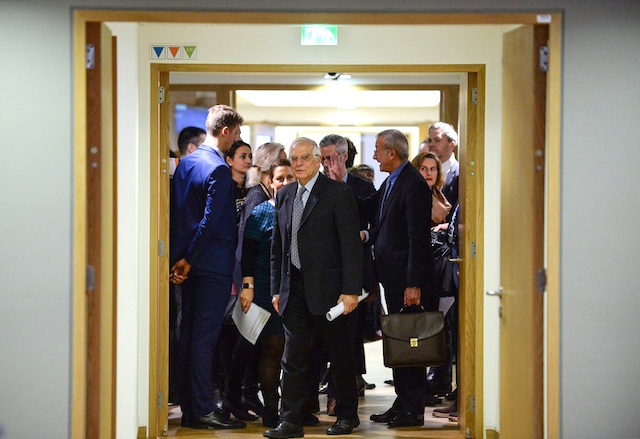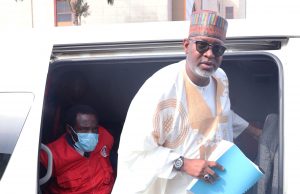SPECIAL BRIEFING : Seven Priorities for the New EU High Representative

As Josep Borrell steps into his role as the new EU High Representative for Foreign Affairs and Security Policy, Crisis Group highlights seven countries where European leadership can combine political, financial and technical resources to rebuild and sustain peace and stability.What’s new? Seasoned Spanish diplomat Josep Borrell became the EU’s chief diplomat last week, replacing Federica Mogherini as the High Representative of the Union for Foreign Affairs and Security Policy.Why does it matter? With the EU-U.S. partnership increasingly strained and crises threatening peace and security around the world, European leadership is urgently needed to prevent and mitigate deadly conflict. In his new role, Borrell can help the EU and its member states rise to the challenge.What should be done? Borrell should guide Europe’s focus to crises where its political ties, economic clout, and technical acumen can help forge peace and repair the ravages of war. This briefing suggests seven priorities that should command his attention.I. OverviewLast week, former Spanish Foreign Minister Josep Borrell became the EU’s chief diplomat, succeeding Federica Mogherini as the High Representative of the Union for Foreign Affairs and Security Policy and Vice President of the European Commission. He will face no shortage of challenges. These will include not only the peace and security matters in his substantive portfolio – from saving a fraying Iran nuclear deal to bolstering Sudan’s fragile transition – but also the hard work of building consensus among 28 European member states about how to address these challenges. Borrell’s work will be all the more difficult given the declining state of Europe’s traditional partnerships, with Washington’s foreign policy more transactional and less focused on conflict prevention, and the UN Security Council frequently deadlocked by tensions among its permanent members. Still, the EU can accomplish much good if the new High Representative can help it focus its attention wisely and summon the will to act.Borrell’s success is likely to hinge on his ability to focus the Council on conflict prevention, forge greater member state cohesion on policy in this area, and encourage greater follow-through once Brussels decides on a course of action. This will require no small measure of old-school diplomacy – cultivating strong relationships with the European foreign ministers who serve on the Foreign Affairs Council that he will chair, and finding ways to get their ministries more invested in the EU’s common positions. Borrell’s predecessor Mogherini, for example, invited the Finnish foreign minister to represent the EU in the Horn of Africa and Gulf region in July 2019 amid negotiations over Sudan’s transitional arrangements.The most important task for Borrell, however, will be to identify crises where the EU – through its political ties, economic clout, security initiatives or technical expertise – is well-positioned to play a positive if not indispensable role. The seven priorities listed below would be a good place to start.II. Seven Priorities for Borrell1. Throw Khartoum a lifelineIn the wake of Omar al-Bashir’s ouster in April 2019, the EU and its member states have an important opportunity to support Sudan as it navigates a fraught transition to civilian rule. The country has swung between hope that change is coming and impatience for the transition to bear fruit since 11 April, when the most sustained civilian protest movement in the country’s modern history swept Bashir from power. Although the generals who ultimately deposed Bashir have shown reluctance to cede power, a wave of international revulsion at security forces’ brutal 3 June attack on protesters in Khartoum galvanised support for mediation that yielded a power-sharing agreement on 17 August.If all goes according to the deal struck in August, the country will complete its transition to civilian rule following elections in 2022. But for that to happen, the civilians in Khartoum’s transitional government – led by Prime Minister Abdalla Hamdok – need a major assist from international partners that has yet to materialise. These civilian leaders bear the outsize hopes and expectations of a public that desperately seeks an economic lifeline after years of brutal kleptocracy. As they struggle to keep the reins of government in civilian hands, and away from a politically and economically powerful security sector, demonstrating that the transition is already producing tangible benefits for the Sudanese people will be critical.Brussels can help. Hamdok has estimated that Sudan will need an infusion of at least $10 billion over the next two years to rebuild its devastated economy. Donors such as the EU and its member states, the U.S. and Gulf countries, should pull out all the stops to meet this request responsibly. The immediate objective should be to bolster Hamdok’s transitional government so it can begin responding to public demands for economic relief (and thereby strengthen its hand relative to the security sector). The EU announced €55 million in humanitarian aid during Prime Minister Hamdok’s visit to Brussels in November, and will contribute some €250 million in total to the country in development, stabilisation and humanitarian aid by the end of 2020. Yet these contributions – however generous – remain a proverbial drop in the bucket given the scale of support required to deliver on this once-in-a-generation opportunity.As an immediate priority, Borrell should work with new Commissioner Jutta Urpilainen – who took up the EU’s development portfolio just as Borrell stepped into his new post – to mobilise support for Khartoum.Primarily this means mustering budget support and further quick impact development financing for the government while Hamdok pushes forward with a package of reforms and addresses core economic challenges, including stabilising the currency and commodity prices, tackling inflation and reducing youth unemployment. Brussels can also help by providing technical assistance to Hamdok and his team as they seek to put government finances on a more solid footing by consolidating revenue streams and centralising them within a transparent fiscal framework.Khartoum also needs all the diplomatic help it can get in pressing the U.S. government to lift Sudan’s designation as a state sponsor of terrorism. Removing this out-of-date label would help Sudan reconnect to the international financial system, spur foreign investment and – perhaps most important – pave the way for Khartoum to seek relief of its staggering $60 billion debt burden. To address U.S. concerns that the security establishment will move to retake full power, Borrell should underscore his commitment to working with Washington to marshal European support for new sanctions targeting any spoilers who impede Sudan’s political or economic transition.2. Raise the level of EU ambition in LibyaIn Libya, Borrell faces a conflict on Europe’s doorstep. A violent flare-up in April 2019 deepened the divisions between forces aligned with the UN-sponsored Government of National Accord (GNA) in Tripoli and the Libyan National Army (LNA) based in the East and led by Field Marshal Khalifa Haftar. Upward of 1,500 people have been killed since the beginning of the latest confrontation, neither side appears ready to embark on talks with its rival, and Haftar appears convinced that odds are in his favour to gain the upper hand via military means.The war in Libya has also become increasingly internationalised, reflecting geopolitical divides throughout the Middle East and beyond. Qatar and Turkey are backing the GNA financially and militarily, respectively, while Haftar receives military support from the United Arab Emirates, Egypt and Russia, and financial support from Saudi Arabia. International support to the two sides has enabled the mobilisation of fighters and resources and prolonged this proxy war.The EU and its member states have struggled to develop an effective approach to the Libyan conflict. One challenge is that different states support different sides. The EU and its member states have struggled to develop an effective approach to the Libyan conflict. One challenge is that different states support different sides. Most prominently, Italy maintains closer relations to the GNA while France is more aligned with Haftar, although recently the two countries have begun to consult and coordinate more closely, hosting joint diplomatic talks at the margins of the UN General Assembly in September. Another challenge is that EU policy has tended to focus less on ending the conflict and more on blunting its impact on migration into Europe. Southern European countries, as well as migration hardliners like Austria and Hungary, have pushed the EU to invest more in technical assistance to stop migrant flows across the central Mediterranean, at the expense of focusing on finding a political solution to end the crisis.Seeking to create momentum for a political resolution through the so-called “Berlin Process”, in recent months Germany has stepped up its support to UN Special Representative of the Secretary-General and Head of the UN Support Mission in Libya Ghassan Salamé in his efforts to broker a ceasefire, encourage implementation of the UN arms embargo on all Libyan factions and return the sides to negotiations. Germany’s efforts have so far focused on monthly consultations among UN Security Council permanent members and key countries involved in the conflict, as well as the EU, African Union, and League of Arab States, with the aim of encouraging them to get the Libyan factions to return to talks.Germany was planning to host a conference of external stakeholders in November where it would further seek their support in pushing Libyan allies to negotiate in earnest, but that has slid to the beginning of 2020 at the earliest; in the meantime, hopes for progress have suffered a number of setbacks. The LNA have resisted calls to negotiate and are pushing for a military advantage, increasingly relying on support from Russian fighters employed through a private security contractor. Washington has vocally objected to this support, adding another unhelpful point of friction with Moscow. Moreover, in November the GNA and Turkey announced a new agreement to delineate Libya’s maritime boundary with Turkey in a way that would both infringe upon Greek maritime claims and potentially undermine Egyptian financial interests in the Eastern Mediterranean. In creating a new source of tension between Ankara and Cairo, the announcement further divided them at a moment when their cooperation is needed to advance Berlin’s process.So what can Borrell do? For one, he should focus on the operational issues that bedevilled his predecessor. This means pressing member states to reinvigorate the EU’s maritime “Operation Sophia” so that it can maintain a meaningful naval presence in the Mediterranean (it currently has none) as a deterrent against the flow of embargoed arms into Libya, while also helping to save the lives of migrants in distress. It also means moving, as soon as the situation allows, to reopen the EU Delegation in Tripoli. At the same time, however, Borrell should make clear to both the peacemakers and the war wagers that Brussels will be throwing its weight fully behind German and UN efforts to strike a comprehensive military, political and economic settlement that can end this conflict.3. Save the Iran Nuclear Agreement and de-escalate tensions in the GulfEighteen months after the U.S. quit the Joint Comprehensive Plan of Action (JCPOA), the EU and the E3 (France, Germany and the UK) are at the forefront of efforts both to keep the deal from completely unravelling, and to steer Tehran and Washington away from a collision course that could set off a region-wide chain reaction.Borrell takes office at an especially fraught moment. Just weeks ago, on 5 November, Iran announced that it would restart uranium enrichment activities at the underground Fordow facility, prompting the EU and E3 to threaten invoking the JCPOA’s dispute resolution mechanism. If they do so – either now or in response to Iran’s potential next step – this ultimately could lead to the re-imposition of UN sanctions suspended by the JCPOA and spell the end of the deal.There is of course a backstory to Tehran’s provocations. Upon leaving the JCPOA, the U.S. embarked on a campaign of “maximum pressure” intended to force Iranian concessions through re-imposing unilateral economic sanctions. Iran initially adopted a posture of strategic patience, hoping that its nuclear compliance would encourage the rest of the world to continue trading with Iran in defiance of U.S. restrictions. As the U.S. upped its pressure (most notably, in April 2019, revoking the sanction waivers that had previously allowed eight countries to import Iranian oil) and Iran’s other partners were unwilling or unable to meaningfully circumvent American sanctions and maintain trade, Iran’s leadership shifted course.The result has been dangerous on three levels. First, Iran has embarked on a series of steps downgrading its compliance with the nuclear accord – the 5 November announcement being the latest, though likely not the last. Secondly, it has acted in ways that threaten to push an already volatile region over the brink. These include the 20 June downing of a U.S. drone and a 14 September missile and drone attack against Aramco’s Abqaiq-Khurais facilities that the U.S., Saudi Arabia and the E3 attribute to Tehran. More recently, the U.S. has pointed a finger at Tehran in the wake of apparent attacks on American military bases in Iraq. A significant incident involving U.S. forces or U.S. allies could result in retaliation by Washington, which has twice already come close to retaliatory action against Iran (after the drone downing and Abqaiq attack). Thirdly, widespread protests across Iran in the second half of November underscore growing political and economic frustration that the government violently repressed. If the U.S. continues to squeeze Iran economically, and the Islamic Republic continues to resort to an iron fist against mounting dissent, further turmoil is likely.If the U.S. continues to squeeze Iran economically, and the Islamic Republic con-tinues to resort to an iron fist against mounting dissent, further turmoil is likely. Borrell should seek to marshal EU and E3 efforts to find a way out of the current escalatory cycle. The best possible off-ramp appears to be a version of the de-escalation package France put forward at the sidelines of the UN General Assembly in September. A deal by which Iran returns to full JCPOA compliance and refrains from direct or indirect regional provocations in return for the E3 providing a financial reprieve in the form of an increase in Iran’s oil exports (and, importantly, the U.S. facilitating such a step through waivers) could at least freeze tensions. The window for negotiating such a deal may prove very narrow, as Iran’s upcoming legislative elections in February and U.S. presidential elections in November could make progress after February 2020 more difficult.4. Re-launch Venezuela’s stalled talksAs Spain’s foreign minister, Borrell colourfully likened the U.S. to an overeager cowboy in its efforts to push Nicolás Maduro’s government from power through a combination of sanctions and intimidation. Although the saloon-style shoot-out Borrell seemed to warn against has not happened, the situation in Venezuela remains at a dangerous standstill. The country is caught between the government’s inflexibility and the opposition’s unrealistic expectations, which have been fuelled by the U.S. Trapped in the middle, amid a dramatic humanitarian catastrophe, are the Venezuelan people.There were flickers of hope in the past year. Talks sponsored by Norway and backed by the EU in Oslo and later Barbados emerged as the most promising venue for promoting an agreement between the government and opposition, but were suspended after the former withdrew in early August, citing the imposition of new U.S. sanctions the day before. Then, on 15 September, the opposition, led by Juan Guaidó, pronounced the mediation mechanism was “exhausted”.Meanwhile, both sides have turned to other strategies. The government struck a deal with five minority opposition parties excluded from the Barbados talks; together, they announced an agreement calling for the return of government lawmakers to the National Assembly, the release of some political prisoners and reforms to the electoral system. For its part, the mainstream opposition requested – and obtained – activation by its Latin American and U.S. allies of a regional mutual defence treaty (the 1947 Rio Treaty, known as the TIAR in Spanish), which some at the time took to herald the possibility of military intervention.Alongside financial support and its humanitarian presence on the ground, the EU could usefully provide technical expertise to help manage movements in the region. If the two sides could refocus their energies, however, progress is still possible. The most realistic, viable outcome would entail negotiated compromises by all sides. President Maduro should agree to internationally monitored, credible elections (probably only parliamentary in the first instance, but leading to an early presidential poll afterward) and to the institutional reforms necessary to make that happen. Guaidó and the opposition should soften their demands that Maduro quit immediately, and cooperate with the government on moves to restore fair political competition. The U.S., with opposition backing, should stop tying any sanctions relief to Maduro’s departure, instead agreeing to ease them gradually them in exchange for meaningful concessions from Caracas. And both the government and opposition should reach an understanding on political guarantees to safeguard the rights of election losers.With Borrell’s encouragement, the EU would be well placed to champion an effort along these lines. The Brussels-backed International Contact Group, which came together (in part through Borrell’s efforts) to encourage a negotiated compromise to the crisis in Venezuela, could help – including by encouraging key allies on both sides, especially the U.S. and Russia, to persuade their respective partners to return to the table and work in good faith toward an agreement.Brussels can also help the region manage the spillover effects of the crisis. Venezuela’s neighbours are under great pressure; some 4.3 million Venezuelans have fled to nearby countries, including 1.6 million to Colombia alone. The EU recently pledged €157 million, but Borrell might be able to mobilise greater resources still by continuing to push for multi-donor commitments in cooperation with UN agencies. Alongside financial support and its humanitarian presence on the ground, the EU could usefully provide technical expertise to help manage movements in the region.5. Keep pulling Bolivia back from the brinkAs unrest ripples through Latin America, Bolivia is another country in political crisis that would benefit from continuing European support. After close to fourteen years in power, Bolivia’s first indigenous president, Evo Morales, tendered his resignation on 10 November amid deepening unrest over electoral fraud and under strong pressure from the armed forces. Along with Morales, the upper echelons of the ruling Movement toward Socialism (MAS) party also quit.Views on what occurred are deeply polarised: for Morales’ supporters, his departure from power was a coup; his opponents saw it as restoring democracy. In the days that followed the resignation, Jeanine Áñez, an opposition senator, became next in line for the presidency. On 12 November, she asserted her claim to the interim post, saying her primary tasks would be to “pacify the country” and organise elections.It did not go smoothly. Violence flared following Morales’ ouster, as MAS supporters took to the streets and met with a fierce crackdown from security forces, leading to massacres at Cochabamba and El Alto and over twenty deaths. Áñez did little to calm the waters, stirring fears that she would reverse Morales’ efforts to ensure greater equality between the nation’s Christian and indigenous communities, and hand additional powers to the military – especially after she issued a decree granting immunity from prosecution for any crimes committed in handling the protests.Toward the end of November, the situation started to take a turn for the better, in large part thanks to mediation by the Catholic Church, the EU and UN Special Envoy Jean Arnault. Áñez struck a deal with protest leaders to clear roadblocks in exchange for a commitment to release prisoners jailed during the violence, preserve some of Morales’ public policies and withdraw troops from areas of unrest. Under pressure from human rights groups, she repealed the military immunity decree she had issued. Perhaps more important, she also signed into law a new bill agreed with the MAS to annul the recent election, calling for new ones within 120 days and directing the reconstitution of the Supreme Electoral Tribunal, which will oversee them. Neither Morales nor his former vice president, Álvaro García Linera, will be permitted to stand because of term limits, but the MAS party will be allowed to participate – an important step toward a peaceful resolution to this period of crisis.Whether or not Bolivia is fully back from the brink remains to be seen, and for at least the next 120 days it will be important for external partners to keep a close eye on the situation. Because Morales’ supporters consider Brazil, the U.S. and even the Organization of American States biased, the EU could have an especially important mediating role to play in ensuring a transition that bridges the bitter divisions in Bolivia’s body politic, and avoids a confrontation that an increasingly tumultuous region can ill afford. It should make clear that it is prepared to play this role, and that it will press the new government that emerges not to reverse the gains in economic and political opportunity for Bolivia’s indigenous majority made under Morales’ government. At the technical level, the EU should also offer to provide an electoral observation mission for the forthcoming polls, and give support where necessary for the new Supreme Electoral Tribunal.6. In Syria, focus on refugees, the reconstruction conundrum, and repatriationAlthough Syria is unlikely to stabilise during Borrell’s term as High Representative, he could focus on areas where the EU and its member states can alleviate the suffering of Syrians whose lives have been torn apart by the long-running conflict. He can also help address the situation of ISIS-affiliated European nationals who are currently held in a network of camps and prisons in Syria’s north east.First, the EU and its member states should continue to make a priority of supporting Syria’s neighbouring countries, which host the vast majority of Syrian refugees – many of whom embarked on a perilous journey to Europe and found themselves stranded in camps. These countries are themselves under economic stress. Borrell’s overarching goal in this respect should be to work with EU member states as well as host and transit countries to identify and fund programs that can cultivate refugees’ self-reliance through employment and education, and help host countries bear the burden of supporting them.Second, the new High Representative should work with member states to navigate concerns that funding reconstruction support without substantial reforms could legitimise and empower a Syrian regime intent on repression, not reconciliation. Although the EU has been clear that it will not provide support for reconstruction projects without a political transition being “firmly underway”, Borrell could respect this red line and at the same time encourage European leaders to develop a common framework with criteria and rules to enable small-scale rehabilitation projects. Such support should only move forward without interference from the regime in Damascus, as Crisis Group has proposed elsewhere.The High Representative should […] encourage the repatriation of the roughly 1,450 ISIS-affiliated European nationals detained in north east Syria amid squalor, disease and abuse. Supporting projects of this nature could help prevent the collapse of essential public services, which would indefinitely postpone Syria’s recovery and perpetuate current instability – an outcome that would serve neither the Syrian people nor European interests. Borrell could also work with member states on a strategy to test an incremental incentives-based approach – progressively lifting sanctions, gradually normalising relations and staggering the disbursement of reconstruction funds – in exchange for meaningful political reforms and steps by Damascus to ease repression and discrimination.Finally, the High Representative should use regular exchanges with EU foreign ministers to encourage the repatriation of the roughly 1,450 ISIS-affiliated European nationals detained in north east Syria amid squalor, disease and abuse. Constrained by domestic politics and insecure about their capacity to prosecute and police returnees, most European governments have thus far done the very least they could get away with; they should instead be stretching to do the most.While the repatriation of European nationals remains a competence of EU member states – and is therefore not Borrell’s immediate responsibility – he can certainly make the case for more responsible national-level policies and better coordination among states. In doing so, he should urge governments to move women and children to the front of the repatriation queue. Although European governments may feel that there is no politically palatable way to bring home men – especially given the experience some states have had with returning foreign fighters and high-profile incidents like the recent London Bridge attack – children are victims of circumstance, and many women were not directly involved in ISIS operations. Borrell should also argue that beyond the humanitarian benefits, their repatriation could mitigate a range of security risks, from adults escaping to return home on their own terms, to children being abandoned amid the camps’ hopelessness and left vulnerable to future recruitment by armed groups.7. Ease Ethiopia’s transitionSince coming to power a year and a half ago, Prime Minister Abiy Ahmed has taken important steps to open up Ethiopia’s politics. But his government has struggled to check intercommunal strife that has killed hundreds, displaced millions and fuelled hostility among leaders of Ethiopia’s most powerful regions over the past two years. Any wholesale destabilisation of this pivotal East African country would have disastrous consequences. Borrell and other European leaders should work to avoid this by urging Abiy to proceed cautiously with political reforms, calling on all Ethiopian leaders to dial down incendiary rhetoric and offering multi-year aid to cushion against economic shocks that would aggravate the country’s political problems.Since taking office in April 2018, Abiy has made much progress. He ended a decades-long standoff with Eritrea. Following his predecessor Hailemariam Desalegn’s lead, he freed scores of political prisoners and welcomed dissidents back from exile. He brought reformists into institutions like the electoral board and economic ministries. He has won accolades at home and abroad, including the 2019 Nobel Peace Prize.But serious problems loom. The mass protests between 2015 and 2018 that brought Abiy to power were motivated by the government’s abuses and failure to tackle rising living costs, youth unemployment and other day-to-day concerns. But they also had undertones of ethnic hostility. Especially in the two regions that saw the most unrest, Oromia (Abiy’s home state) and Amhara, local leaders backed protesters hoping to reverse the long-dominant Tigray minority’s influence in the country’s federal institutions and security forces.European allies […] should urge Abiy to proceed cautiously with political reforms and try to mitigate risks around forthcoming elections. Abiy has tried to strike a middle ground between continuity and reform since coming to power, but his approach has not quieted ethno-nationalist forces clamouring for more influence, and some of his efforts at change have angered coalition colleagues. Some of his moves have weakened the state, leaving it less able to contain instability. Elections scheduled for May 2020 could be violent and divisive, as candidates compete for votes from within their respective ethnic groups and parties vie for control of contested cities.If managed poorly, Abiy’s ongoing effort to remake into one party the coalition that has ruled Ethiopia since 1991 – the Ethiopian People’s Revolutionary Democratic Front (EPRDF), which comprises the ruling parties of Oromia, Amhara and Tigray regions, as well as a fourth, the Southern Nations, Nationalities and Peoples’ region – risks deepening divisions. Already that coalition is fraying, its increasing dysfunction at once reflecting and fuelling ethnic animosity. While Abiy’s merger initiative enjoys support, it also generates resistance from opponents – particularly Tigrayan leaders but also some of Abiy’s Oromo rivals – who fear it as the first step toward undoing the country’s ethnic federalist system that guarantees regions self-rule.Borrell can encourage European allies to ease the challenges Abiy is facing, taking his cue from the EU Special Representative to the Horn of Africa, Alexander Rondos. First, they should urge Abiy to proceed cautiously with political reforms and try to mitigate risks around forthcoming elections. If Ethiopia proceeds to a May 2020 vote, European leaders could press Abiy to intensify efforts to bring together parties and civil society, with the goal of setting red lines for political behaviour and taking some of the sting out of the forthcoming contest. If conditions deteriorate further, European leaders could suggest he seek broad support for a delay and potentially some form of national dialogue to start addressing questions of power-sharing, devolution and territory. Finally, Borrell could work with his development counterpart Jutta Urpilainen to rally European support for multi-year package of financial aid to help strengthen institutions, bolster an economy undergoing structural reform and decrease risks of discontent among a restive and youthful population.Brussels, 12 December 2019







